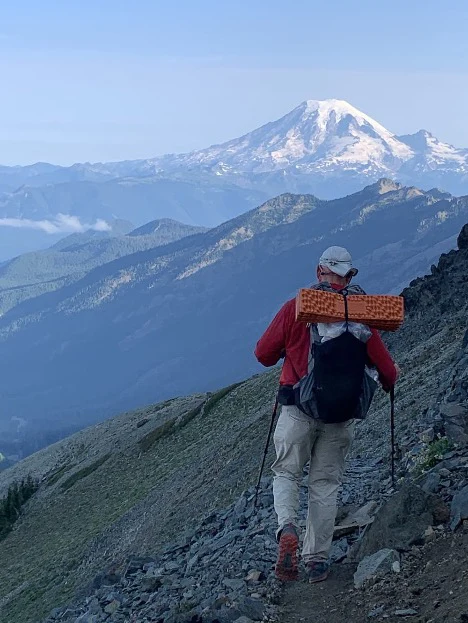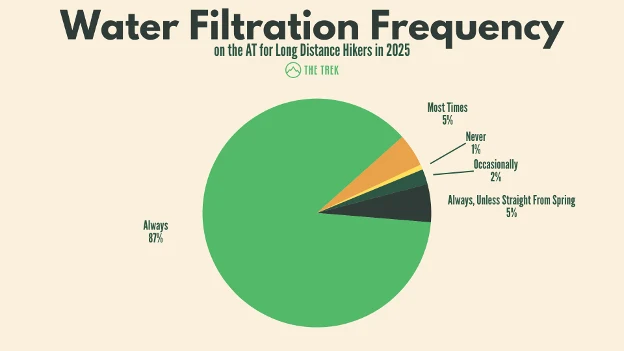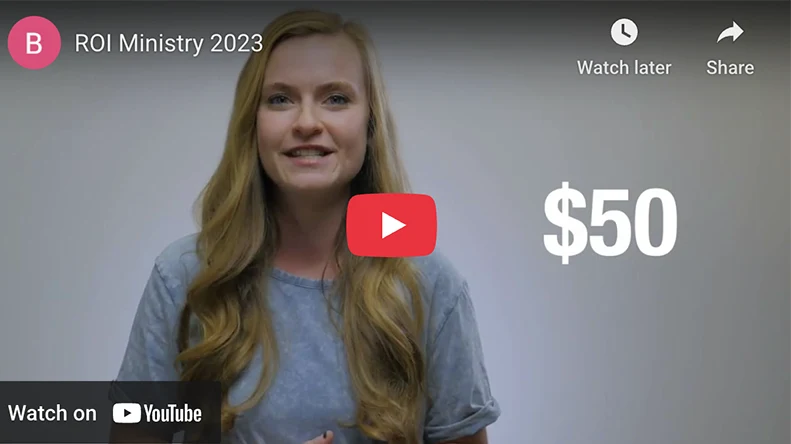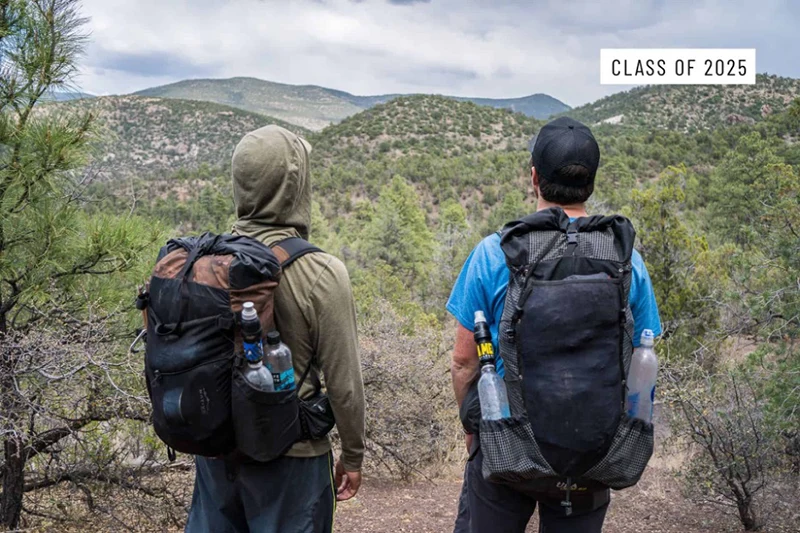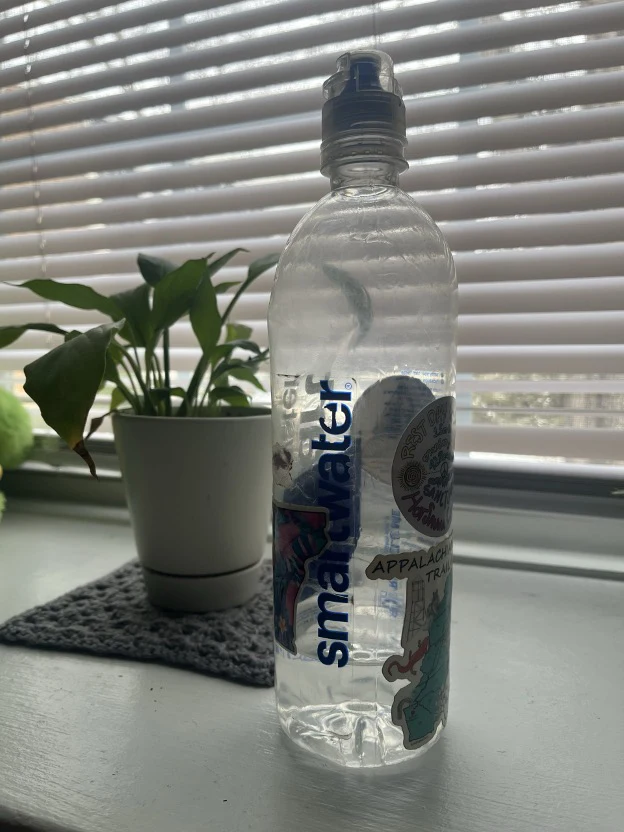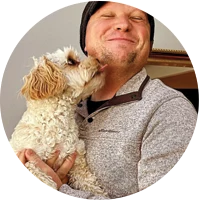Freedom From Gender in the Outdoors
Freedom From Gender in the Outdoors

Freedom From Gender in the Outdoors
YouTube video highlight
On the trails around Blacksburg, I found peace and freedom from a gendered society.
Read more about the projectI have decided to thru hike the Appalachian Trail because I want an escape. In September of 2021, my senior year of college, I was becoming the antithesis of everything I hoped I’d be. I was avoiding writing anything, nearing the end of a two and a half year long relationship where I can remember thinking: I’d rather be in this than face who I am, and blacking out almost every night of the week. I would wake up and my assignments would be finished, and I’d have no idea how they got turned in. I would also wake up with intense shakes, a feeling that the world was going to rip apart (clinically known as an impending sense of doom) and a feeling that I was about to have a seizure, which are all common symptoms of those suffering from alcohol withdrawal. Alcohol withdrawal?! I was twenty-one years old, what was I trying so hard to escape from? A long-standing problem with a short answer: myself.

There were many times I knew I needed to change. Scrabbling at a handle of liquor that wouldn’t open in front of a room of my worried-looking friends. Sobbing in my car after my ex told me that he didn’t believe in gay people, and that transgender people shouldn’t exist. Flipping through pages of empty notebooks that were only filled with tear stains. The only peace I could ever find was by escaping to the Appalachian Trail surrounding Blacksburg, where my biggest concerns were finding my way back to the trailhead and climbing safely down a rock face. I couldn’t drink if I wanted to be physically able to hike.
The trail taught me to honor my body — because if I didn’t, it would be a lot harder to continue onwards.
Out on the trail, transphobic comments couldn’t reach me without cell service, and my gender dysphoria was quieted at the incredible overlooks my body could bring me to. During my solo hikes and backpacking trips, I started to realize I didn’t feel like a woman or a man. I was something in between, as free as the natural world around me. I wasn’t anything that could fit into gendered society. Off trail, I hesitated with every form that asked me to check male or female. I overthought every bathroom I walked into. I dreaded introducing myself with pronouns; I worried I wasn’t queer enough for they/them or straight enough for she/her. I wanted to scream. And so I did — I’d go out on the trail (after checking no one was around) and scream. I’d go to the bathroom wherever I wanted, dig a hole and feel like a rugged outdoors person.
In the outdoors, I’d forget all about the forms and the bathrooms and the pronouns and just rejoice in being alive. I could be who I was. Who I am. A poet, a dirtbag, a human. The mountains didn’t care. And neither did I.
One afternoon while sitting at the top of Dragon’s Tooth and watching the sunset, it dawned on me that if I didn’t start accepting myself, I could die before I ever knew who I really was. And so I walked away from the relationship. I felt the most free I ever had up until that point. I knew I had made the right choice.
After I graduated, I landed in a job that gave me the same constraining feeling the relationship had. I was sexually harassed by someone within my first six months of working there, and never felt like I could talk about anything regarding my gender or sexuality.
I was right back in the closet, except this time, with the added dread of being trapped inside a cis female body that old men found attractive — and frequently let me know.
This was not my first experience with sexual harassment. When I was sixteen, I had been assaulted almost nightly for two years working at a restaurant where men in their thirties and forties would grab my hips and restrain me for others to kiss. I thought my first job out of college would be different. I was wrong. I told my boss about it, and he told me: it would just happen again. So I quit. I started finalizing my plans for my biggest escape yet: a thru hike of the Appalachian Trail.
In the meantime, I threw myself into trail running. I had always enjoyed adventure runs. When I was in high school, running for three or four hours after school meant I could explore mountains, trespass in cornfields and run along the tops of abandoned trains. They were fun adventures that I could bring myself on, fueled by my own bodily strength, which was important to me at a time when my body was frequently being used against me, without my consent.
And so, just three months after the sexual harassment at my new job, I found myself at the starting line of a 50k.

This time, running had brought me a support system of new friends through the ultramarathon club at Virginia Tech and the same freedom it always had. I was using it to prepare for the AT, I told myself. However, running had become my new addiction. I had overtrained.
During the ultra, I could feel my IT bands snapping against my knees, thwacking like rubber bands. I was in a lot of pain. But I didn’t want it to stop. I ran harder. I was angry. With every footstep I drove into the ground, I was consumed by frustration that despite all my qualifications for the job, despite freeing myself from a toxic relationship, despite starting to accept my non-binary identity — it didn’t matter. I was still powerless against people who sexualized my body without my consent. I didn’t even resonate with being a woman, and others were using my feminine features against me. I didn’t want to be inside my body. I was powerless inside it. Powerless, except for the hurt I could cause it, and in those moments, I felt like my body deserved it. I felt like I deserved it.
After the race, I could barely walk. When I got home, I couldn’t eat, drink, or have any bowel movements. I (literally) crawled into bed. When I woke up, I couldn’t lift my left leg without searing pain in my hip. I was supposed to thru hike the Appalachian Trail in two months. What had I done?

Overnight, I went from future thru hiker and ultramarathoner to injured and unemployed bum living on my friend’s couch. Yikes. Life continues to amaze me with how quickly it can change my self-perception. I decided to channel my addictive personality into intense self-care. This time, I threw myself into physical therapy. Anything the physical therapist said was my own personal set of commandments. My hips had become misaligned throughout my running obsession, and now I was working to get them level again. I was instructed to lay flat on my stomach, mitigate walking, and do upwards of six stretches three times a day. This might seem easy to do at first — but try doing it for over two months, and it gets difficult. There were many days when it was difficult to not become frustrated with my body again — and overall, myself. I had gotten myself into this mess. It was my fault I might not even be able to go on a journey I had planned for a year, all because of a six hour long race.
Every time those thoughts started to creep in, I realized there was no point in worrying about the future because I wasn’t there yet. I let myself feel the guilt and regret, and then gently told myself it was time to move on. I would bring myself back to the present with a snack (usually I was just hungry), drink some water, and channel my frustrations into playing guitar, painting with watercolors, or writing poetry. When negativity seeped in, I found it was best to find something to help my body first, and then do something to help my mind. In Shakespeare’s words, nothing is good or bad, it’s thinking that makes it so. And in the words of a thru hiker I asked for advice during one of my solo hikes, sometimes, when things are really tough, you just need to sit down for a minute and breathe. I did a lot of breathing during those two months of recovery.

I did my stretches daily and tried my best to celebrate every small victory. I took on the mentality that every day, my body was healing, bit by bit. The more negative thoughts you allow into your head, the more power you give them over yourself — as you can see from my thought process during the ultramarathon. If I were more mindful of my body and goals for my future, maybe I would have stopped and taken care of myself more. Negativity only breeds misfortune. Regardless, this recovery period has allowed me to strengthen my resolve in being more optimistic and kind to myself. I’m the only one who has to live in my head after all, so I might as well make it a nice place.
I tried my best to stay positive as small victories came, like being able to straighten my leg when I laid down, being able to stand fully upright, being able to take a step, being able to walk again — and then, being able to walk more than a mile again. I developed a deeper appreciation and respect for my body. Self-hatred might have pushed me through 32 miles, but it will not help me walk 2,000 miles. To this day, I have not missed a single repetition of stretches in 73 days. I plan to continue my exercises on trail.

Now, I look towards my start date on April 19 as not just an escape, but as a journey of self-acceptance. Along the way, I will be fundraising for the Venture Out Project, a nonprofit that brings queer and transgender people backpacking, so that others can find the same release and strength I did in nature. I hope my journey of self-acceptance can help someone else take the first steps of their own. On the trails around Blacksburg, I found peace and freedom from a gendered society. After an ultramarathon, I found strength in myself and respect for my body. More importantly, I am finding a home in my own skin and am finding time to heal the bond between my mind and body. If I have found all these self-discoveries in the time preparing for the trail, then I can’t wait to find myself in Maine.
Freedom From Gender in the Outdoors


I have decided to thru hike the Appalachian Trail because I want an escape. In September of 2021, my senior year of college, I was becoming the antithesis of everything I hoped I’d be. I was avoiding writing anything, nearing the end of a two and a half year long relationship where I can remember thinking: I’d rather be in this than face who I am, and blacking out almost every night of the week. I would wake up and my assignments would be finished, and I’d have no idea how they got turned in. I would also wake up with intense shakes, a feeling that the world was going to rip apart (clinically known as an impending sense of doom) and a feeling that I was about to have a seizure, which are all common symptoms of those suffering from alcohol withdrawal. Alcohol withdrawal?! I was twenty-one years old, what was I trying so hard to escape from? A long-standing problem with a short answer: myself.

There were many times I knew I needed to change. Scrabbling at a handle of liquor that wouldn’t open in front of a room of my worried-looking friends. Sobbing in my car after my ex told me that he didn’t believe in gay people, and that transgender people shouldn’t exist. Flipping through pages of empty notebooks that were only filled with tear stains. The only peace I could ever find was by escaping to the Appalachian Trail surrounding Blacksburg, where my biggest concerns were finding my way back to the trailhead and climbing safely down a rock face. I couldn’t drink if I wanted to be physically able to hike.
The trail taught me to honor my body — because if I didn’t, it would be a lot harder to continue onwards.
Out on the trail, transphobic comments couldn’t reach me without cell service, and my gender dysphoria was quieted at the incredible overlooks my body could bring me to. During my solo hikes and backpacking trips, I started to realize I didn’t feel like a woman or a man. I was something in between, as free as the natural world around me. I wasn’t anything that could fit into gendered society. Off trail, I hesitated with every form that asked me to check male or female. I overthought every bathroom I walked into. I dreaded introducing myself with pronouns; I worried I wasn’t queer enough for they/them or straight enough for she/her. I wanted to scream. And so I did — I’d go out on the trail (after checking no one was around) and scream. I’d go to the bathroom wherever I wanted, dig a hole and feel like a rugged outdoors person.
In the outdoors, I’d forget all about the forms and the bathrooms and the pronouns and just rejoice in being alive. I could be who I was. Who I am. A poet, a dirtbag, a human. The mountains didn’t care. And neither did I.
One afternoon while sitting at the top of Dragon’s Tooth and watching the sunset, it dawned on me that if I didn’t start accepting myself, I could die before I ever knew who I really was. And so I walked away from the relationship. I felt the most free I ever had up until that point. I knew I had made the right choice.
After I graduated, I landed in a job that gave me the same constraining feeling the relationship had. I was sexually harassed by someone within my first six months of working there, and never felt like I could talk about anything regarding my gender or sexuality.
I was right back in the closet, except this time, with the added dread of being trapped inside a cis female body that old men found attractive — and frequently let me know.
This was not my first experience with sexual harassment. When I was sixteen, I had been assaulted almost nightly for two years working at a restaurant where men in their thirties and forties would grab my hips and restrain me for others to kiss. I thought my first job out of college would be different. I was wrong. I told my boss about it, and he told me: it would just happen again. So I quit. I started finalizing my plans for my biggest escape yet: a thru hike of the Appalachian Trail.
In the meantime, I threw myself into trail running. I had always enjoyed adventure runs. When I was in high school, running for three or four hours after school meant I could explore mountains, trespass in cornfields and run along the tops of abandoned trains. They were fun adventures that I could bring myself on, fueled by my own bodily strength, which was important to me at a time when my body was frequently being used against me, without my consent.
And so, just three months after the sexual harassment at my new job, I found myself at the starting line of a 50k.

This time, running had brought me a support system of new friends through the ultramarathon club at Virginia Tech and the same freedom it always had. I was using it to prepare for the AT, I told myself. However, running had become my new addiction. I had overtrained.
During the ultra, I could feel my IT bands snapping against my knees, thwacking like rubber bands. I was in a lot of pain. But I didn’t want it to stop. I ran harder. I was angry. With every footstep I drove into the ground, I was consumed by frustration that despite all my qualifications for the job, despite freeing myself from a toxic relationship, despite starting to accept my non-binary identity — it didn’t matter. I was still powerless against people who sexualized my body without my consent. I didn’t even resonate with being a woman, and others were using my feminine features against me. I didn’t want to be inside my body. I was powerless inside it. Powerless, except for the hurt I could cause it, and in those moments, I felt like my body deserved it. I felt like I deserved it.
After the race, I could barely walk. When I got home, I couldn’t eat, drink, or have any bowel movements. I (literally) crawled into bed. When I woke up, I couldn’t lift my left leg without searing pain in my hip. I was supposed to thru hike the Appalachian Trail in two months. What had I done?

Overnight, I went from future thru hiker and ultramarathoner to injured and unemployed bum living on my friend’s couch. Yikes. Life continues to amaze me with how quickly it can change my self-perception. I decided to channel my addictive personality into intense self-care. This time, I threw myself into physical therapy. Anything the physical therapist said was my own personal set of commandments. My hips had become misaligned throughout my running obsession, and now I was working to get them level again. I was instructed to lay flat on my stomach, mitigate walking, and do upwards of six stretches three times a day. This might seem easy to do at first — but try doing it for over two months, and it gets difficult. There were many days when it was difficult to not become frustrated with my body again — and overall, myself. I had gotten myself into this mess. It was my fault I might not even be able to go on a journey I had planned for a year, all because of a six hour long race.
Every time those thoughts started to creep in, I realized there was no point in worrying about the future because I wasn’t there yet. I let myself feel the guilt and regret, and then gently told myself it was time to move on. I would bring myself back to the present with a snack (usually I was just hungry), drink some water, and channel my frustrations into playing guitar, painting with watercolors, or writing poetry. When negativity seeped in, I found it was best to find something to help my body first, and then do something to help my mind. In Shakespeare’s words, nothing is good or bad, it’s thinking that makes it so. And in the words of a thru hiker I asked for advice during one of my solo hikes, sometimes, when things are really tough, you just need to sit down for a minute and breathe. I did a lot of breathing during those two months of recovery.

I did my stretches daily and tried my best to celebrate every small victory. I took on the mentality that every day, my body was healing, bit by bit. The more negative thoughts you allow into your head, the more power you give them over yourself — as you can see from my thought process during the ultramarathon. If I were more mindful of my body and goals for my future, maybe I would have stopped and taken care of myself more. Negativity only breeds misfortune. Regardless, this recovery period has allowed me to strengthen my resolve in being more optimistic and kind to myself. I’m the only one who has to live in my head after all, so I might as well make it a nice place.
I tried my best to stay positive as small victories came, like being able to straighten my leg when I laid down, being able to stand fully upright, being able to take a step, being able to walk again — and then, being able to walk more than a mile again. I developed a deeper appreciation and respect for my body. Self-hatred might have pushed me through 32 miles, but it will not help me walk 2,000 miles. To this day, I have not missed a single repetition of stretches in 73 days. I plan to continue my exercises on trail.

Now, I look towards my start date on April 19 as not just an escape, but as a journey of self-acceptance. Along the way, I will be fundraising for the Venture Out Project, a nonprofit that brings queer and transgender people backpacking, so that others can find the same release and strength I did in nature. I hope my journey of self-acceptance can help someone else take the first steps of their own. On the trails around Blacksburg, I found peace and freedom from a gendered society. After an ultramarathon, I found strength in myself and respect for my body. More importantly, I am finding a home in my own skin and am finding time to heal the bond between my mind and body. If I have found all these self-discoveries in the time preparing for the trail, then I can’t wait to find myself in Maine.
Freedom From Gender in the Outdoors


I have decided to thru hike the Appalachian Trail because I want an escape. In September of 2021, my senior year of college, I was becoming the antithesis of everything I hoped I’d be. I was avoiding writing anything, nearing the end of a two and a half year long relationship where I can remember thinking: I’d rather be in this than face who I am, and blacking out almost every night of the week. I would wake up and my assignments would be finished, and I’d have no idea how they got turned in. I would also wake up with intense shakes, a feeling that the world was going to rip apart (clinically known as an impending sense of doom) and a feeling that I was about to have a seizure, which are all common symptoms of those suffering from alcohol withdrawal. Alcohol withdrawal?! I was twenty-one years old, what was I trying so hard to escape from? A long-standing problem with a short answer: myself.

There were many times I knew I needed to change. Scrabbling at a handle of liquor that wouldn’t open in front of a room of my worried-looking friends. Sobbing in my car after my ex told me that he didn’t believe in gay people, and that transgender people shouldn’t exist. Flipping through pages of empty notebooks that were only filled with tear stains. The only peace I could ever find was by escaping to the Appalachian Trail surrounding Blacksburg, where my biggest concerns were finding my way back to the trailhead and climbing safely down a rock face. I couldn’t drink if I wanted to be physically able to hike.
The trail taught me to honor my body — because if I didn’t, it would be a lot harder to continue onwards.
Out on the trail, transphobic comments couldn’t reach me without cell service, and my gender dysphoria was quieted at the incredible overlooks my body could bring me to. During my solo hikes and backpacking trips, I started to realize I didn’t feel like a woman or a man. I was something in between, as free as the natural world around me. I wasn’t anything that could fit into gendered society. Off trail, I hesitated with every form that asked me to check male or female. I overthought every bathroom I walked into. I dreaded introducing myself with pronouns; I worried I wasn’t queer enough for they/them or straight enough for she/her. I wanted to scream. And so I did — I’d go out on the trail (after checking no one was around) and scream. I’d go to the bathroom wherever I wanted, dig a hole and feel like a rugged outdoors person.
In the outdoors, I’d forget all about the forms and the bathrooms and the pronouns and just rejoice in being alive. I could be who I was. Who I am. A poet, a dirtbag, a human. The mountains didn’t care. And neither did I.
One afternoon while sitting at the top of Dragon’s Tooth and watching the sunset, it dawned on me that if I didn’t start accepting myself, I could die before I ever knew who I really was. And so I walked away from the relationship. I felt the most free I ever had up until that point. I knew I had made the right choice.
After I graduated, I landed in a job that gave me the same constraining feeling the relationship had. I was sexually harassed by someone within my first six months of working there, and never felt like I could talk about anything regarding my gender or sexuality.
I was right back in the closet, except this time, with the added dread of being trapped inside a cis female body that old men found attractive — and frequently let me know.
This was not my first experience with sexual harassment. When I was sixteen, I had been assaulted almost nightly for two years working at a restaurant where men in their thirties and forties would grab my hips and restrain me for others to kiss. I thought my first job out of college would be different. I was wrong. I told my boss about it, and he told me: it would just happen again. So I quit. I started finalizing my plans for my biggest escape yet: a thru hike of the Appalachian Trail.
In the meantime, I threw myself into trail running. I had always enjoyed adventure runs. When I was in high school, running for three or four hours after school meant I could explore mountains, trespass in cornfields and run along the tops of abandoned trains. They were fun adventures that I could bring myself on, fueled by my own bodily strength, which was important to me at a time when my body was frequently being used against me, without my consent.
And so, just three months after the sexual harassment at my new job, I found myself at the starting line of a 50k.

This time, running had brought me a support system of new friends through the ultramarathon club at Virginia Tech and the same freedom it always had. I was using it to prepare for the AT, I told myself. However, running had become my new addiction. I had overtrained.
During the ultra, I could feel my IT bands snapping against my knees, thwacking like rubber bands. I was in a lot of pain. But I didn’t want it to stop. I ran harder. I was angry. With every footstep I drove into the ground, I was consumed by frustration that despite all my qualifications for the job, despite freeing myself from a toxic relationship, despite starting to accept my non-binary identity — it didn’t matter. I was still powerless against people who sexualized my body without my consent. I didn’t even resonate with being a woman, and others were using my feminine features against me. I didn’t want to be inside my body. I was powerless inside it. Powerless, except for the hurt I could cause it, and in those moments, I felt like my body deserved it. I felt like I deserved it.
After the race, I could barely walk. When I got home, I couldn’t eat, drink, or have any bowel movements. I (literally) crawled into bed. When I woke up, I couldn’t lift my left leg without searing pain in my hip. I was supposed to thru hike the Appalachian Trail in two months. What had I done?

Overnight, I went from future thru hiker and ultramarathoner to injured and unemployed bum living on my friend’s couch. Yikes. Life continues to amaze me with how quickly it can change my self-perception. I decided to channel my addictive personality into intense self-care. This time, I threw myself into physical therapy. Anything the physical therapist said was my own personal set of commandments. My hips had become misaligned throughout my running obsession, and now I was working to get them level again. I was instructed to lay flat on my stomach, mitigate walking, and do upwards of six stretches three times a day. This might seem easy to do at first — but try doing it for over two months, and it gets difficult. There were many days when it was difficult to not become frustrated with my body again — and overall, myself. I had gotten myself into this mess. It was my fault I might not even be able to go on a journey I had planned for a year, all because of a six hour long race.
Every time those thoughts started to creep in, I realized there was no point in worrying about the future because I wasn’t there yet. I let myself feel the guilt and regret, and then gently told myself it was time to move on. I would bring myself back to the present with a snack (usually I was just hungry), drink some water, and channel my frustrations into playing guitar, painting with watercolors, or writing poetry. When negativity seeped in, I found it was best to find something to help my body first, and then do something to help my mind. In Shakespeare’s words, nothing is good or bad, it’s thinking that makes it so. And in the words of a thru hiker I asked for advice during one of my solo hikes, sometimes, when things are really tough, you just need to sit down for a minute and breathe. I did a lot of breathing during those two months of recovery.

I did my stretches daily and tried my best to celebrate every small victory. I took on the mentality that every day, my body was healing, bit by bit. The more negative thoughts you allow into your head, the more power you give them over yourself — as you can see from my thought process during the ultramarathon. If I were more mindful of my body and goals for my future, maybe I would have stopped and taken care of myself more. Negativity only breeds misfortune. Regardless, this recovery period has allowed me to strengthen my resolve in being more optimistic and kind to myself. I’m the only one who has to live in my head after all, so I might as well make it a nice place.
I tried my best to stay positive as small victories came, like being able to straighten my leg when I laid down, being able to stand fully upright, being able to take a step, being able to walk again — and then, being able to walk more than a mile again. I developed a deeper appreciation and respect for my body. Self-hatred might have pushed me through 32 miles, but it will not help me walk 2,000 miles. To this day, I have not missed a single repetition of stretches in 73 days. I plan to continue my exercises on trail.

Now, I look towards my start date on April 19 as not just an escape, but as a journey of self-acceptance. Along the way, I will be fundraising for the Venture Out Project, a nonprofit that brings queer and transgender people backpacking, so that others can find the same release and strength I did in nature. I hope my journey of self-acceptance can help someone else take the first steps of their own. On the trails around Blacksburg, I found peace and freedom from a gendered society. After an ultramarathon, I found strength in myself and respect for my body. More importantly, I am finding a home in my own skin and am finding time to heal the bond between my mind and body. If I have found all these self-discoveries in the time preparing for the trail, then I can’t wait to find myself in Maine.







